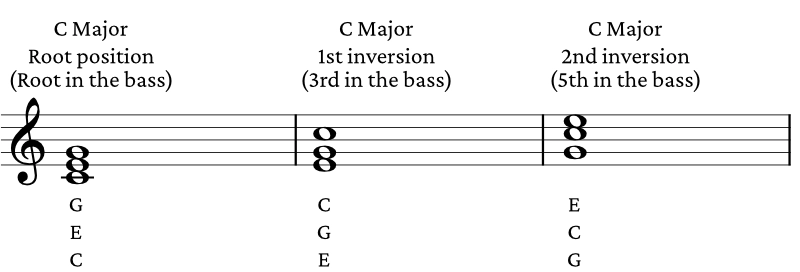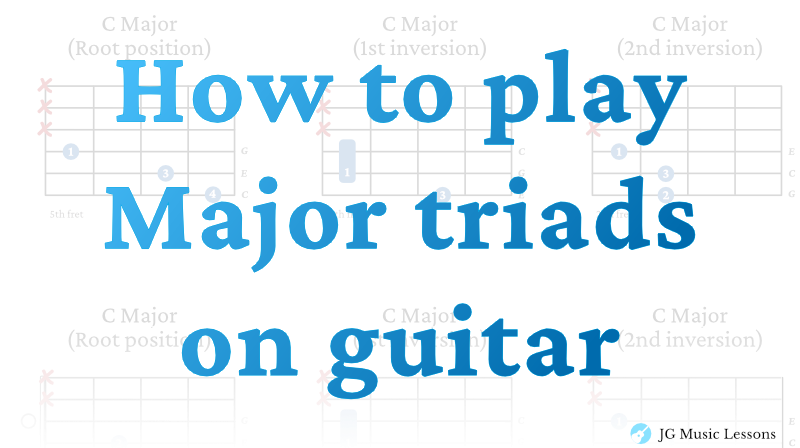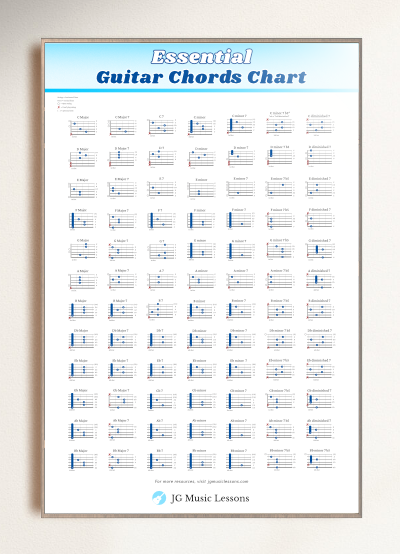Triads form the backbone of most chords and are a great tool for outlining harmony, building melodies, and improvising.
While the concept is simple in theory, learning how to apply triads all over the guitar neck takes practice but it’s well worth the effort.
In this lesson, you’ll learn how to play Major triads, explore their inversions on different string sets, practice arpeggio shapes across the fretboard, and work through pattern based exercises to lock them in.
Grab your guitar and let’s get started!
✨PDF included with the Pro Membership
What is a Major Triad?
A triad is a chord made up of three notes, which can be played together or broken up into an arpeggio. A Major triad specifically uses the chord tones 1, 3, and 5. For example, a C Major triad includes the notes C, E, and G.
The formula to build a Major triad is: 2 whole steps from the root to the 3rd, and 1.5 whole steps from the 3rd to the 5th. See the image below for a visual breakdown.
Major Triad Formula

In contrast, minor triads are built on 3 notes using the chord tones 1, b3, and 5. For example, a C minor triad has the notes C, Eb, and G. See the minor triads lesson here.
Major Triads Chart
With this formula in mind, here is a chart of the 12 Major triad chords.
| Major triad chord | 1 | 3 | 5 |
|---|---|---|---|
| C Major triad | C | E | G |
| D Major triad | D | F# | A |
| E Major triad | E | G# | B |
| F Major triad | F | A | C |
| G Major triad | G | B | D |
| A Major triad | A | C# | E |
| B Major triad | B | D# | F# |
| Db Major triad | Db | F | Ab |
| Eb Major triad | Eb | G | Bb |
| Gb Major triad | Gb | Bb | Db |
| Ab Major triad | Ab | C | Eb |
| Bb Major triad | Bb | D | F |
Major Triad Shapes on Different Strings
The first step to learning Major triads is knowing the different ways to play it on one guitar string. We’ll use the C Major triad for these examples.
Major Triads – 6th String
Here are three ways you can play a C Major triad starting on the 6th string below.

Major Triads – 5th String
The three shapes starting on the 5th string look the same as the ones on the 6th string.

Major Triads – 4th String
The Major triad shapes starting on the 4th string look slightly different than the 6th and 5th string triad shapes.

Major Triads – 3rd String
The Major triad shapes starting on the 3rd string also have unique shapes that look different from the ones on the other strings.

All of these Major triad shapes can be applied to any root note on the same string. Make sure to adjust the fingerings whenever open strings are included.
Major Triad Inversions
Once you’re familiar with Major triads, the next step is learning inversions, which is simply a rearrangement of the chord where a different chord tone is in the bass (lowest) note.. This changes the sound and feel of the chord while keeping its harmonic identity, and it can make transitions between chords smoother.
Here’s how a Major triad can be voiced using different chord tones in the bass:
- Root position – the root is in the bass (e.g. C)
- 1st inversion – the 3rd is in the bass (e.g. C/E)
- 2nd inversion – the 5th is in the bass (e.g. C/G)
These are often written as slash chords, showing the chord and its bass note after the slash (see below):
- C/E = C Major with E in the bass
- C/G = C Major with G in the bass
Below is an example of a C Major triad shown in all three positions using standard notation.

Now let’s look at how to play a Major triad and it’s inversions starting on different strings below.

Major Triads Guitar Chord Charts
The following charts show you what the Major triads look like in chord form for each string.
Major Triad Chords – 6th String

Major Triad Chords – 5th String

Major Triad Chords – 4th String

Major Triad Chords – 3rd String

Again, when playing chords with open strings, make sure to adjust these fingerings to what is most comfortable for you.
Moving Triad Chord Shapes
Once you learn a triad shape on the guitar, you can conveniently shift to different starting points to play other triad chords on the same string.
The following example shows you how a triad chord is shifted throughout the fretboard to play different chords.

Using Triads in a Chord Progression
If you were to play over a progression, meaning a series of chords, you can use triads to weave your way through by finding the closest related notes. This serves as a nice tool you can use for accompaniment.
Example 1
Here is an application example in a progression using arpeggios.

Example 2

Major Triad Arpeggios Shapes
For the previous examples, we’ve been learning Major triads horizontally across one string. In this section, we’ll be looking at the vertical triad shapes throughout the fretboard. Again, we’ll be using the C Major triad for the following examples.
Arpeggio Shape 1

Arpeggio Shape 2

Arpeggio Shape 3

Arpeggio Shape 4

Arpeggio Shape 5

Keep in mind that fingerings change whenever you have open strings included in a triad. Experiment with different fingerings to see what works best for you.
Connecting Arpeggio Shape – Two octaves
Here is an example of how to connect the Major triad shapes throughout the fretboard. We’ll be using the E Major triad for this example.

Major Triad Exercises
The following exercises can be applied to any of the arpeggio shapes on the fretboard. Here are some pattern exercises over one area of the fretboard using the C Major triad.
3 Note Pattern
After playing three consecutive notes of a triad, repeat the pattern on the second to last note (C, E, G then E, G, C, etc…)
🔒 This section is for Pro Members only.

✨PDF included with the Pro Membership
Major Triads Quiz
To test your knowledge on Major Triads, try to figure out the three chord tones for each of the chords below. *Tip: When counting the steps between notes, the notes B to C and E to F are the exceptions which are a half step apart.
- G Major Triad
- D Major Triad
- F Major Triad
- B Major Triad
- E Major Triad
- A Major Triad
- Bb Major Triad
(Answers revealed in the next section).
Major Triad Quiz Answers
Here is the answer key for the previous quiz questions.
- G, B, D
- D, F#, A
- F, A, C
- B, D#, F#
- E, G#, B
- A, C#, E
- Bb, D, F
Wrapping up
Triads are a simple yet powerful way to outline chord harmony, and learning how to play Major triads across different strings, in their various inversions, and as arpeggio shapes opens up a lot of musical possibilities.
To fully internalize them, try practicing these shapes and exercises in different keys. This will strengthen your fretboard awareness and help you connect musical ideas more fluidly.
Understanding triads not only helps you move more smoothly between chords, but also deepens your grasp of how the fretboard works. Triads are the building blocks of more complex chords and can be a great starting point for improvisation and creative playing.
The more fluently you can play and apply triads, the more freedom you’ll have to express musical ideas with confidence.
Want to keep going? Check out these related lessons:
📘 Get the free guitar practice guide here!



